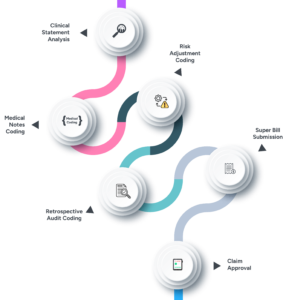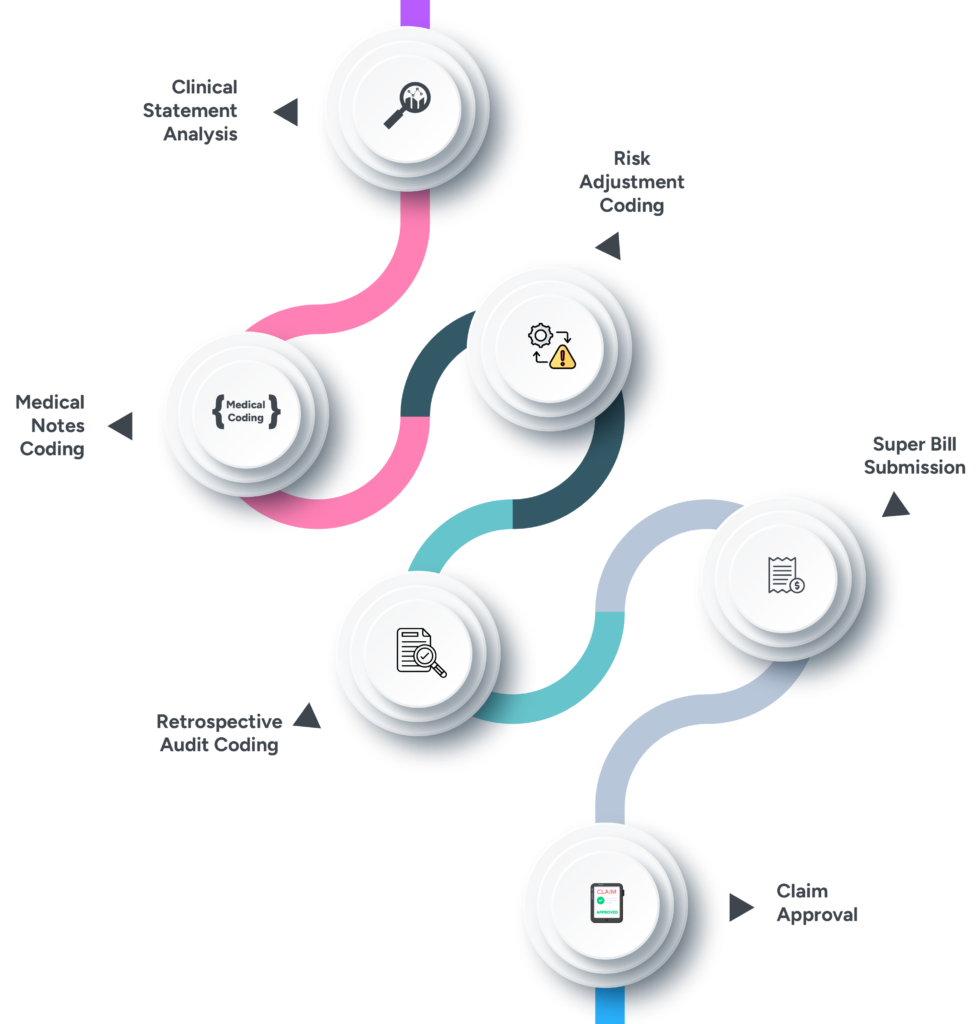With ASP RCM get assured with Best Hospital Coding Services, No Revenue Leakage, get paid on-time
Medical Coding services, including Physician, Hospital, and Multispecialty Coding, are the need of healthcare providers in the USA. Our expert Clinical Coders fulfill the coding needs of every specialty by assigning diagnosis and procedure codes that facilitate the creation of claims for submission to payers. Providers receive timely payment, patients are accurately billed for services, and payers accept claims without rejections.
 Clinical Statement Analysis
Clinical Statement Analysis
Hospital Coding Services: The Backbone of Healthcare Revenue Management
In the rapidly evolving healthcare industry, hospital coding services are a critical component of financial sustainability and operational efficiency. These services involve the translation of patient care documentation into standardized medical codes used for billing, insurance claims, data analysis, and regulatory compliance. Without accurate and timely medical coding, healthcare providers may face financial losses, legal issues, and compromised patient care quality.
What Are Hospital Coding Services?
Hospital coding is the process of converting the diagnoses, procedures, and medical services documented by healthcare professionals into alphanumeric codes using systems like:
- ICD-10 (International Classification of Diseases)
- CPT (Current Procedural Terminology)
- HCPCS (Healthcare Common Procedure Coding System)
These codes are then used to create insurance claims, which are submitted to payers such as insurance companies, Medicare, and Medicaid for reimbursement.
Types of Hospital Coding
- Inpatient Coding – For patients admitted to the hospital for overnight stays or longer.
- Outpatient Coding – Involves services like diagnostic tests, emergency room visits, and minor surgeries.
- Professional Coding – Refers to coding done for services provided by individual physicians or specialists.
- Facility Coding – Pertains to services rendered by the hospital as an institution, such as nursing care and use of hospital equipment.
Importance of Accurate Coding
- Ensures Reimbursement Proper coding is crucial for receiving timely and full payments from payers. Even small coding errors can result in claim denials or reduced payments.
- Maintains Compliance Healthcare regulations and billing standards must be strictly followed. Inaccurate coding can lead to compliance violations, audits, fines, and legal consequences.
- Improves Data Analytics Medical codes help hospitals track health trends, patient outcomes, and resource use. This data is key to planning, budgeting, and improving care delivery.
- Supports Patient Care While coding is mostly administrative, it helps maintain accurate medical records and histories, which are vital for long-term patient care management.
How the Coding Process Works
- Clinical Documentation Review Coders review medical notes, test results, and physician documentation.
- Code Assignment Based on clinical information, coders assign codes that best describe the patient’s condition and treatment.
- Validation and Auditing Quality checks ensure the codes are correct and meet compliance guidelines before claims are submitted.
- Claims Submission Finalized codes are used to generate claims sent to insurance companies or government healthcare programs.
- Appeals and Corrections In case of denials, coders investigate, make corrections, and resubmit claims to ensure providers are reimbursed.
Challenges in Hospital Coding
- Incomplete Documentation: Coders rely heavily on physician notes. Missing or vague information can lead to incorrect coding.
- Frequent Updates: Coding systems and healthcare regulations change regularly, requiring continuous learning.
- Audit Risks: Incorrect or fraudulent coding can result in audits, penalties, and damage to a hospital’s reputation.
- Shortage of Skilled Coders: The demand for certified coders often exceeds the supply, especially in busy hospital environments.
Benefits of Outsourcing Coding Services
Many hospitals are now outsourcing coding to specialized companies due to:
- Access to Certified Experts
- Scalability and Flexibility
- Lower Overhead Costs
- Faster Turnaround Times
- Improved Accuracy and Compliance
Best Practices for Effective Coding
- Regular training and certification updates for coders.
- Collaboration with clinical staff to improve documentation quality.
- Use of advanced technologies like Computer-Assisted Coding (CAC) and Electronic Health Records (EHRs).
- Internal audits to catch and correct errors proactively.
Conclusion
Hospital coding services are much more than a backend operation—they are the financial and compliance backbone of modern healthcare. With accurate and efficient coding, hospitals can ensure fair reimbursement, maintain legal compliance, and enhance patient care. As the healthcare landscape continues to change, investing in strong coding processes and skilled coders is essential for every healthcare facility’s success.



